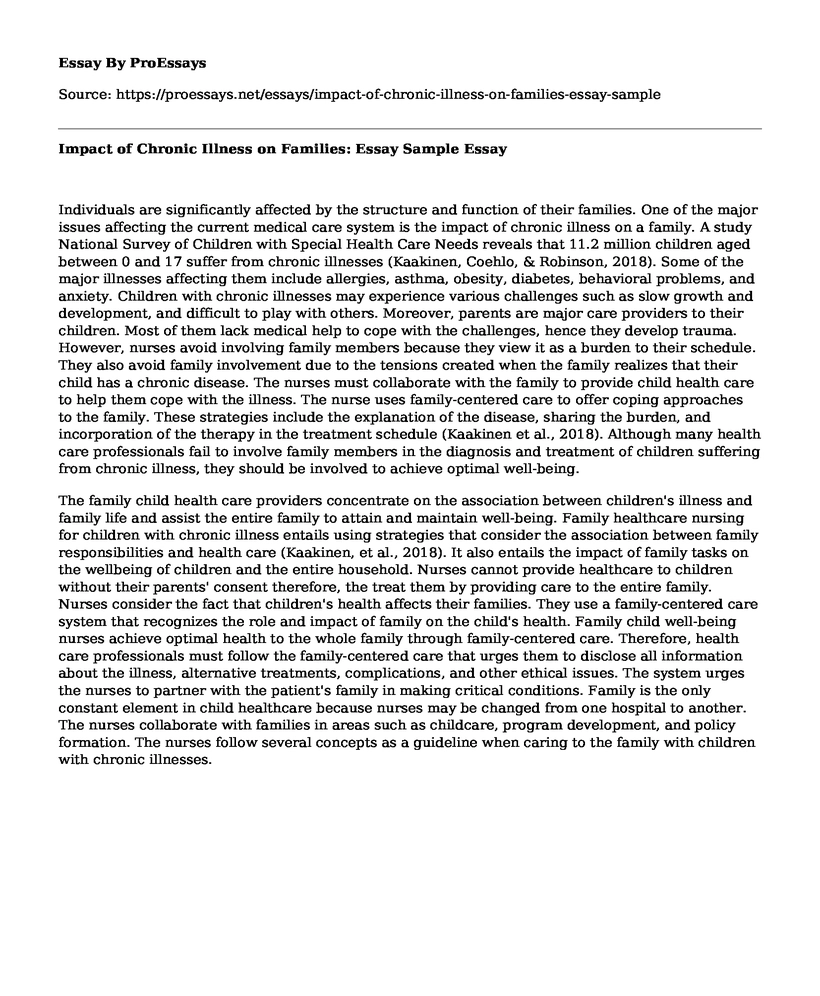Individuals are significantly affected by the structure and function of their families. One of the major issues affecting the current medical care system is the impact of chronic illness on a family. A study National Survey of Children with Special Health Care Needs reveals that 11.2 million children aged between 0 and 17 suffer from chronic illnesses (Kaakinen, Coehlo, & Robinson, 2018). Some of the major illnesses affecting them include allergies, asthma, obesity, diabetes, behavioral problems, and anxiety. Children with chronic illnesses may experience various challenges such as slow growth and development, and difficult to play with others. Moreover, parents are major care providers to their children. Most of them lack medical help to cope with the challenges, hence they develop trauma. However, nurses avoid involving family members because they view it as a burden to their schedule. They also avoid family involvement due to the tensions created when the family realizes that their child has a chronic disease. The nurses must collaborate with the family to provide child health care to help them cope with the illness. The nurse uses family-centered care to offer coping approaches to the family. These strategies include the explanation of the disease, sharing the burden, and incorporation of the therapy in the treatment schedule (Kaakinen et al., 2018). Although many health care professionals fail to involve family members in the diagnosis and treatment of children suffering from chronic illness, they should be involved to achieve optimal well-being.
The family child health care providers concentrate on the association between children's illness and family life and assist the entire family to attain and maintain well-being. Family healthcare nursing for children with chronic illness entails using strategies that consider the association between family responsibilities and health care (Kaakinen, et al., 2018). It also entails the impact of family tasks on the wellbeing of children and the entire household. Nurses cannot provide healthcare to children without their parents' consent therefore, the treat them by providing care to the entire family. Nurses consider the fact that children's health affects their families. They use a family-centered care system that recognizes the role and impact of family on the child's health. Family child well-being nurses achieve optimal health to the whole family through family-centered care. Therefore, health care professionals must follow the family-centered care that urges them to disclose all information about the illness, alternative treatments, complications, and other ethical issues. The system urges the nurses to partner with the patient's family in making critical conditions. Family is the only constant element in child healthcare because nurses may be changed from one hospital to another. The nurses collaborate with families in areas such as childcare, program development, and policy formation. The nurses follow several concepts as a guideline when caring to the family with children with chronic illnesses.
Cite this page
Impact of Chronic Illness on Families: Essay Sample. (2023, Feb 22). Retrieved from https://proessays.net/essays/impact-of-chronic-illness-on-families-essay-sample
If you are the original author of this essay and no longer wish to have it published on the ProEssays website, please click below to request its removal:
- Adversarial Relationships: How to Create Better Relationships
- What Is the Right Thing to Do for Living a Healthy Lifestyle Paper Example
- Ulcer Prevention in Toronto-Based Hospital in Acute Medicine Unit - Essay Sample
- Paper Example on Marjorie's Diet Plan: A Financial Guide for Healthy Living
- Nursing Theories: Foundations for Nursing Practice - Essay Sample
- Paper Example on Torn Ankle to Full Recovery: My Journey in 2015
- Essay Example on CDC's Accountability: Controlling the Spread of Hepatitis A (2017-2020)







